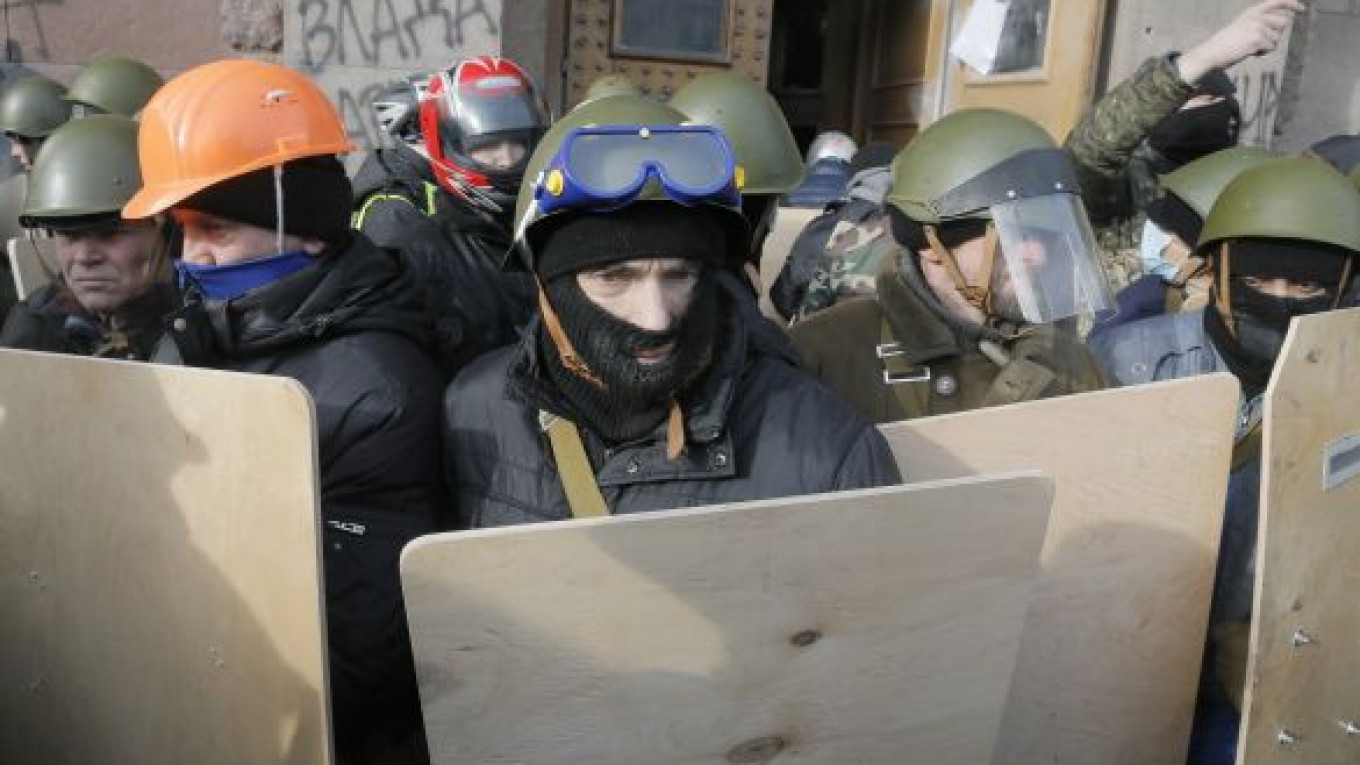KIEV, Ukraine — President Vladimir Putin ordered the government on Wednesday to honor a $15 billion bailout deal for Ukraine, but a minister suggested the make-up of a new government in Kiev will determine how quickly the vital aid is dispatched.
In Kiev, Ukraine's new interim prime minister promised to try to limit the economic damage inflicted by more than two months of turmoil, and said he expected Russia to disburse a further $2 billion aid installment "very soon."
Moscow, however, sent mixed messages on how soon the money, which Ukraine urgently needs, would arrive.
Putin repeated a promise he made on Tuesday to provide the aid even if the opposition forms the next government in Kiev. "I would ask the government to fulfill all our financial agreements in full," he said, according to Interfax.
However, Economic Development Minister Alexei Ulyukayev cast doubt on the timing of the installment. "Our commitment to fulfilling these obligations has been confirmed. As for the schedule and parameters, this is an issue that requires further discussion with our Ukrainian colleagues and consideration of the restructuring of the government," he said, Interfax reported.
Putin agreed to grant the aid package to Ukraine in December, throwing the ex-Soviet state a lifeline in what the opposition and the West regard as a reward for scrapping plans to sign political and trade deals with the European Union and promising to improve ties with Russia.
Ukraine has been gripped by mass unrest since President Viktor Yanukovych walked away from the EU deals last November.
Prime Minister Mykola Azarov resigned on Tuesday in an attempt to appease the protesters and the opposition, and though his deputy has taken over as acting prime minister it is unclear when a new government will be formed.
Leonid Kravchuk, the first president of independent Ukraine, stressed the depth of the crisis on Wednesday.
"The state is on the brink of civil war. We must call what is happening by its proper name. What is happening is revolution because we are talking about an attempt to bring about a change of power," he told parliament.
With Yanukovych and loyalist deputies in parliament now making concessions to defuse the crisis and with Azarov, a Russian-born hardliner, gone, there had been speculation that Moscow might slow or even halt the stream of aid.
But acting prime minister Serhiy Arbuzov appeared to have been cheered by Putin's promise on Tuesday to extend the $15 billion in credits and cheaper gas.
"We have already received the first tranche of $3 billion and expect to receive the second tranche of $2 billion very soon," he said, chairing his first Cabinet meeting. Russian is offering the funds by buying Ukrainian government bonds.
In Kiev, opposition deputies and Yanukovych loyalists were in back-room talks on Wednesday over the wording of a draft law under which protesters detained so far by police would get amnesties.
Though the unrest began because of Yanukovych's U-turn on policy toward Europe, it has since turned into a mass demonstration, punctuated by violent clashes between radical protesters and police, against perceived misrule and corruption under Yanukovych's leadership.
Opposition leaders, including boxer-turned-politician Vitali Klitschko, were resisting demands by Yanukovych's Regions Party for barricades to be removed from roads and for protesters to leave occupied buildings as a precondition for an amnesty for detained activists.
Klitschko, in a comment which also highlighted the tenuous control the opposition leaders have over sections of the protest movement, said: "For us to simply say to people 'you have done your job, now go home' is now not possible."
A Message from The Moscow Times:
Dear readers,
We are facing unprecedented challenges. Russia's Prosecutor General's Office has designated The Moscow Times as an "undesirable" organization, criminalizing our work and putting our staff at risk of prosecution. This follows our earlier unjust labeling as a "foreign agent."
These actions are direct attempts to silence independent journalism in Russia. The authorities claim our work "discredits the decisions of the Russian leadership." We see things differently: we strive to provide accurate, unbiased reporting on Russia.
We, the journalists of The Moscow Times, refuse to be silenced. But to continue our work, we need your help.
Your support, no matter how small, makes a world of difference. If you can, please support us monthly starting from just $2. It's quick to set up, and every contribution makes a significant impact.
By supporting The Moscow Times, you're defending open, independent journalism in the face of repression. Thank you for standing with us.
Remind me later.






